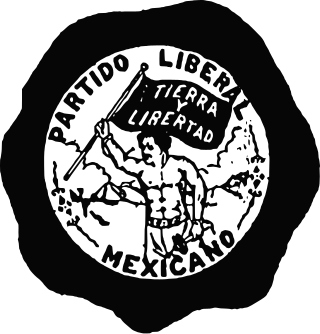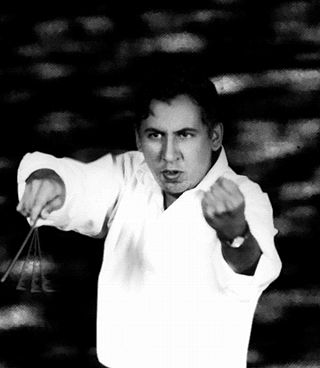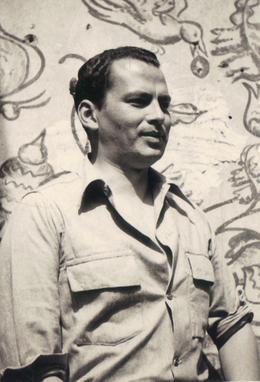
The foreign relations of Mexico are directed by the President of the United Mexican States and managed through the Secretariat of Foreign Affairs. The principles of the foreign policy are constitutionally recognized in the Article 89, Section 10, which include: respect for international law and legal equality of states, their sovereignty and independence, non-intervention in the domestic affairs of other countries, peaceful resolution of conflicts, and promotion of collective security through active participation in international organizations. Since the 1930s, the Estrada Doctrine has served as a crucial complement to these principles.

Luis Echeverría Álvarez was a Mexican lawyer, academic, and politician affiliated with the Institutional Revolutionary Party (PRI), who served as the 57th president of Mexico from 1970 to 1976. Previously, he was Secretary of the Interior from 1963 to 1969. At the time of his death in 2022, he was his country's oldest living former head of state.

Gustavo Díaz Ordaz Bolaños was a Mexican politician and member of the Institutional Revolutionary Party (PRI). He served as the President of Mexico from 1964 to 1970. Previously, he served as a member of the Chamber of Deputies for Puebla's 1st district, a senator of the Congress of the Union for Puebla, and Secretary of the Interior.

Raúl Salinas de Gortari is a Mexican civil engineer and businessman. He is the elder brother of Carlos Salinas de Gortari, the 53rd president of Mexico.

The New Alliance Party is a state-level political party in Mexico founded in 2005.

The Mexican Liberal Party was started in August 1900 when engineer Camilo Arriaga published a manifesto entitled Invitacion al Partido Liberal. The invitation was addressed to Mexican liberals who were dissatisfied with the way the Porfirio Díaz government was deviating from the liberal Constitution of 1857. Arriaga called on Mexican liberals to form local liberal clubs, which would then send delegates to a liberal convention.

Salvador Abascal Infante was a Mexican politician and leading exponent of Mexican synarchism. For a time the leader of the National Synarchist Union (UNS), Abascal represented the orthodox Catholic tendency within the movement.

México Posible was a Mexican political party of brief existence which took part in the midterm 2003 Mexican legislative election. The party was led by Patricia Mercado. Due to its not achieving 2.0% of the national vote the party lost its national registration before the Federal Electoral Institute and thus the party was disbanded.
The Socialist Party of Mexico is a political party in Mexico, founded in 2001. It is led by Rafael Aguilar Talamantes.
The Progressive Constitutionalist Party, known by its acronym PCP, was a liberal political party that existed between 1909 and 1913. Positioned in the political centre of Mexican politics, it drew ideologically from social liberalism, as well as economic liberalism. The party was formed as the conservative wing of the former Liberal Party but not as conservative as the Liberal Party itself under Porfirio Diaz, which in the early 20th century had splintered into more radical factions, represented by the Mexican Liberal Party (PLM).

Alfonso Mejia Arias is a Mexican musician, writer, social activist and politician. He was born in Veracruz, Mexico on 11 September 1961 and has lived mostly in Mexico City, where his family settled.

María Alejandra Bravo de la Parra is a Mexican biochemist who was laureated with the 2010 L'Oréal-UNESCO Award for Women in Science – Latin America for her work on a bacterial toxin that acts as a powerful insecticide. Bravo has co-authored multiple papers with her husband Mario Soberon.
Paulina Lavista is a Mexican photographer, noted for her controversial work which has tested the limits of the field. She is the daughter of a composer and a painter, beginning a career in modeling and cinema before moving into photographic work in the 1960s. She began with portrait work, with one of her first clients being longtime partner Salvador Elizondo, and later breaking into more artistic work with a series of nudes for the magazine Su Otro Yo. She has photographed many subjects from the Mexican art scene as well as images of people in every day activity, mostly in Mexico. She is a member of the Salón de la Plástica Mexicana.
Magonism is an anarchist, or more precisely anarcho-communist, school of thought precursor of the Mexican Revolution of 1910. It is mainly based on the ideas of Ricardo Flores Magón, his brothers Enrique and Jesús, and also other collaborators of the Mexican newspaper Regeneración, as Práxedis Guerrero, Librado Rivera and Anselmo L. Figueroa.

Tomás Chávez Morado was an artist from Silao, Guanajuato, Mexico. He taught at public schools, the Instituto Nacional de Bellas Artes y Literatura, and the Escuela de Artes Plásticas at the Universidad de Guanajuato, where he served as the director of the School of Visual Arts. His civic installations include El Paraguas and the national shield carving displayed at the National Museum of Anthropology in Mexico City as well as 260 monumental eagle head sculptures marking the route of Hidalgo the Liberator. According to Mexican Life, Mexico's Monthly Review, the work of Chávez Morado "creates visions of typical life in the streets, images of people one might find in the markets, at the ferias or inside the tenement patios, with a thematic emphasis on love and the mother and child."

Pablo Soler Frost is a Mexican novelist, essayist, translator, playwright, short-story and screen writer. A polyglot, he has translated into Spanish several works and poems by Shakespeare, Walpole, Walter Scott, Shelley, John Henry Newman, Joseph Conrad, Robert Frost, Rainer M. Rilke, Theodor Daübler and Joanna Walsh.

Hugo López-Gatell is a Mexican epidemiologist, author, and public health official who has served as head of the Undersecretariat of Prevention and Health Promotion at the Mexican Secretariat of Health since 2018. Since January 2020, he has also been the spokesman and one of the lead members of the federal governments response to the COVID-19 pandemic in Mexico.

Gubernatorial elections were held in Mexico on June 6, 2021. Governors were to be elected in the states of Baja California, Baja California Sur, Chihuahua, Colima, Guerrero, Michoacán, Nayarit, Nuevo León, Sinaloa, Sonora, Campeche, Querétaro, San Luis Potosí, Tlaxcala, and Zacatecas. The formal period of campaigning is from March 5 to June 2, 2021.

Local elections were held in Mexico on June 6, 2021. Local elections were held for thirty state congresses, 1,900 town halls, Mexico City borough mayors, municipal boards and municipal presidents. Fifteen gubernatorial elections and federal legislative elections will be held the same day.













